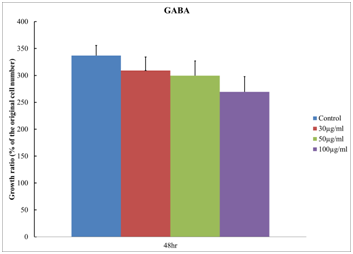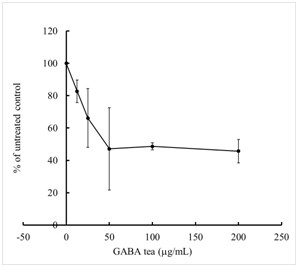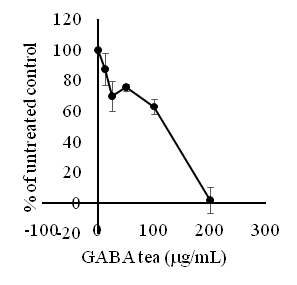MOJ
eISSN: 2381-182X


Case Report Volume 5 Issue 4
1Department of Biotechnology and Pharmaceutical Technology, Yuanpei University of Medical Technology, Taiwan
2Department of Surgery, Cheng-Ching Hospital, Taiwan
3Department of Medical Laboratory Science and Biotechnology, Yuanpei University of Medical Technology, Taiwan
Correspondence: Chih Ping Hsu, Department of Medical Laboratory Science and Biotechnology, Yuanpei University of Medical Technology, Taiwan, No. 306 Yuanpei Street, Hsinchu City, 30015, Taiwan, Tel +886 3 6108166, Fax +886 3 6102312
Received: January 01, 1971 | Published: December 22, 2017
Citation: Lin CC, Chung YC, Hsu CP. GABA tea extract inhibit the colony formation and invasion of colorectal cancer cells. MOJ Food Process Technol. 2017;5(4):349-351. DOI: 10.15406/mojfpt.2017.05.00135
Objectives: The study is aim at evaluating the effects of GABA tea on colorectal cancer cell proliferation, colony formation and invasion.
Methods: Colorectal cancer cell line HT-29 treated with GABA tea extract (12.5~200mg/mL) were assessed for viability by MTT assay and for their invasion potential by evaluating their ability to penetrate through a matrix gel-coated Boyden chamber.
Results: GABA tea extract exhibited slight effect on cell proliferation of HT-29. The colony formation was inhibited in both culture plate and Boyden chamber.
Conclusions: GABA tea extract inhibited the colony formation and invasion of colorectal cancer cells. GABA tea is a potential adjuvant agent for colorectal cancer therapy.
Keywords: GABA tea; colorectal cancer, colony formation, invasion, colorectal carcinoma
Colorectal carcinoma (CRC) became the most prevalent cancer over hepatocellular carcinoma in Taiwan from 2007.1 CRC could progress to become invasive and metastatic malignant cells.2 Tea extract have been shown to reduce the risk of many diseases, including CRC.3-8 GABA tea is a special tea that contains g-aminobutyric acid and is famous on its promoted effect on sleeping. Recently, GABA tea has been shown containing rich amount polyphenols. High level of GABA in tumor tissues is associated with longer survival in breast cancer patients, indicating the prognosis value of GABA.9 However, there is no evidence that GABA tea extract could modulate the growth of CRC cells. Here, we used HT-29 as modeling cells and test the effect of GABA tea extract on cell proliferation, colony formation and invasion.
Cell proliferation assay
HT-29 cells were plated at 10,000 cells per well in 96-well plate. After 18 h of culture, cells were treated with GABA tea extract and stained with MTT after 48 hour treatment. Data were obtained from the averages of three independent experiments.
Clonogenic growth assay
200 cells were seeded in a 6-well plate and treated with GABA tea extract then incubated at 37°C for 14 days. The colonies were fixed in 70% ethanol and stained with 0.2% crystal violet. Colonies of >50 cells were counted and the colony-forming potential of GABA tea-treated cells was expressed as the percentage of colonies of the untreated cells.
Invasion assays
The invasion assay was carried out in modified Boyden’s chambers constructed using multi-well cell-culture plates and inserts (Falcon, Lincoln Park, NJ, USA). 5x104 cells were added to the upper chamber with different concentrations of GABA tea extract in culture medium and were incubated at 37°C for 5 days. The colonies that invaded the basement membrane into the lower chamber were fixed, stained with 0.2% crystal violet, and counted in 10 randomly-selected microscopic fields (x100).
The proliferation of HT-29 was slightly suppressed by GABA tea extract treatment but there was no significant difference between untreated control and the treated cells (Figure 1). Colony formation showed the inhibiting effect of GABA tea extract on HT-29 cell growth, and the colonies were decreased in HT-29 cells treated with up to 12.5 μg/mL GABA tea extract. The inhibition effect seems to be sustained at the level of ~50% up to 50μg/mL GABA tea extract (Figure 2). The results indicated that GABA tea extract exerts an inhibiting effect on CRC cells by means of colony formation. Since colony forming activity is strongly associated with the tumorigenesis of the tumor cells in vivo, this result implicated that GABA could represent the inhibition potential of CRC tumor growth. GABA tea extract also inhibited the invasion potential, as shown in Figure 3, the number of invading cells was gradually decreased after treating with up to 12.5mg/mL GABA. The invasiveness of HT-29 seems to be suppressed by treatment of GABA, implicating the inhibiting effect on the malignant potential of GABA tea extract.

Figure 1 Influence of the proliferation by GABA tea extract in HT-29 cells. HT-29 cells (1x104) were treated with increasing concentrations of GABA tea extract as indicated then incubated at 37°C for 48h. Viable cells were stained with MTT and counted under a spectrophotometer, and cell viability was expressed as the percentage of untreated cells. The data reported are the averages of three independent experiments and are expressed as means±SD.

Figure 2 Inhibition of the colony formation by GABA tea extract in HT-29 cells. A total of 200 HT-29 cells were directly seeded in 6-well plate as described in Methods and treated with different concentrations of GABA tea extract as indicated. Colonies of more than 50 cells were counted under a microscope and are expressed as the percentage of untreated cells. The data reported are the averages of three independent experiments and are expressed as means±SD.

Figure 3 Inhibition of invasion by by GABA tea extract in HT-29 cells. Cells were seeded into the matrix-gel-coated upper side of a Boyden chamber and treated with different concentrations of GABA tea extract as indicated for 5 days. The cells penetrating into the lower side of the Boyden chamber were stained and counted under a microscope. The data reported are the averages of three independent experiments.
In conclusion, this study demonstrates that GABA tea treatment inhibits colony formation and invasion/metastasis in CRC HT-29 cells. GABA tea extract also decreased invasion potential of HT-29 cells. Taken together, we suggest GABA tea could be a potential chemopreventive or therapeutic agent for CRC.
None.
The author declares no conflict of interest.

©2017 Lin, et al. This is an open access article distributed under the terms of the, which permits unrestricted use, distribution, and build upon your work non-commercially.